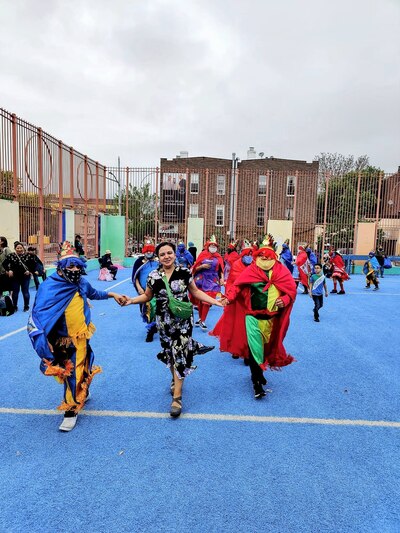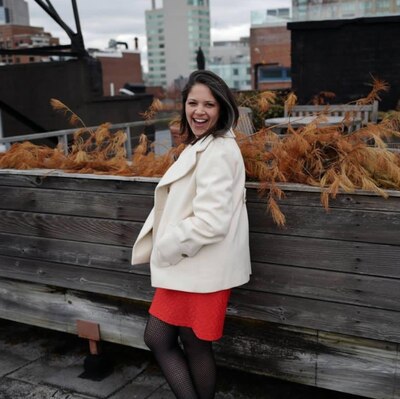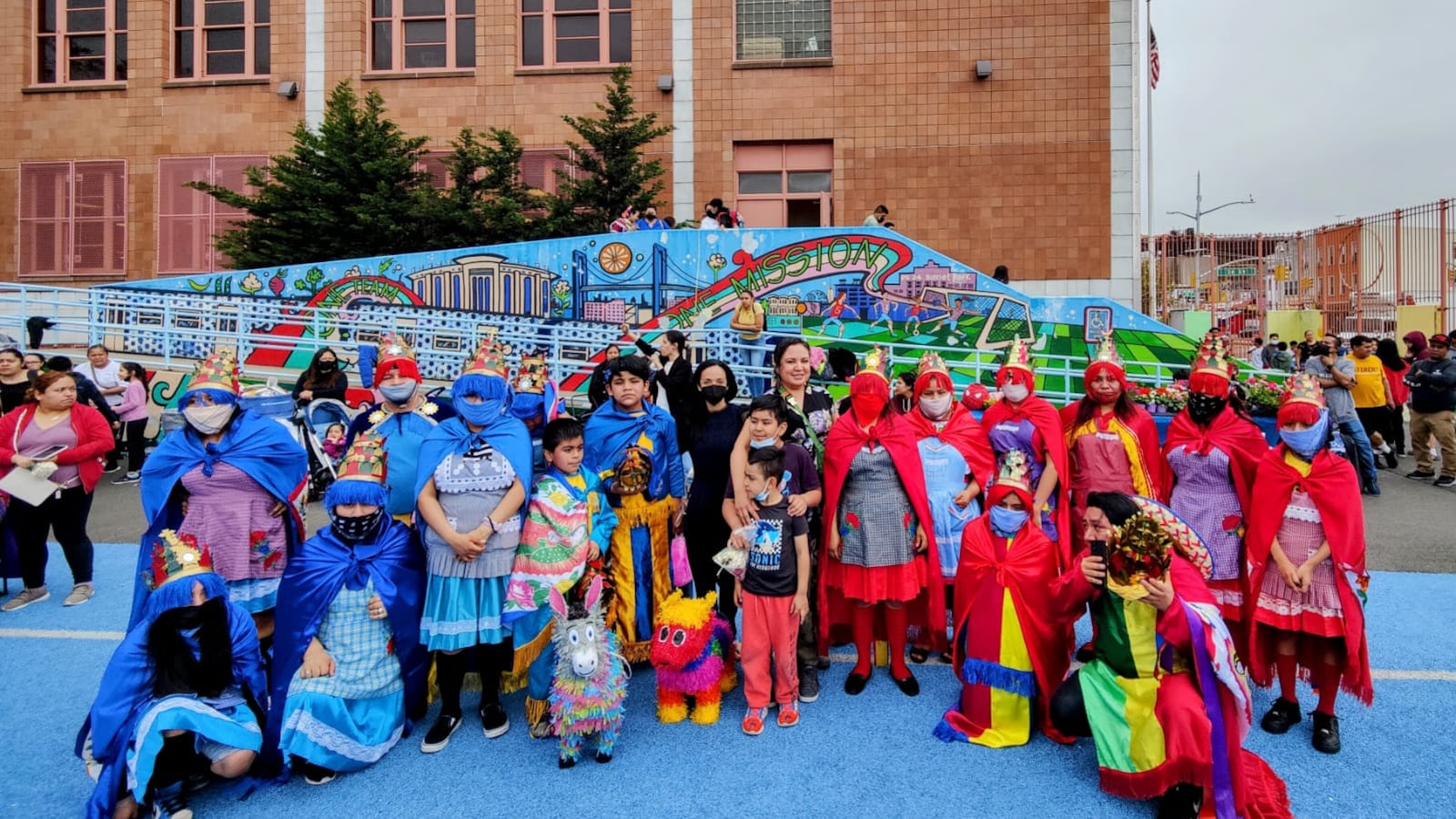Chalkbeat is a nonprofit news organization covering public education in communities across America. Sign up for our free New York newsletter to keep up with NYC’s public schools.
“Family engagement” and “parent empowerment” are not mere buzzwords to Ana Maria Aguilar.
They are her touchstones as parent coordinator at a Brooklyn elementary school, where she sees the faces of her own parents — immigrants from Mexico — reflected in many of the families at drop-off and pickup.
“They come in with such fear. I try to make them feel welcome,” Aguilar said. “As a brown woman, who is also an immigrant, I can relate to their stories.”
That kind of connection drew Aguilar to become parent coordinator at Sunset Park’s P.S. 24 in the fall of 2020, a decision rooted in her desire to give back to her community after losing loved ones to the pandemic. But she found a job remade in many ways by COVID, which caused some parents and students to fear being back in school and ushered in a host of new challenges for staff.
New York City schools created the parent coordinator position 20 years ago as a way to connect families to their children’s schools after then-Mayor Michael Bloomberg assumed control of the nation’s largest school system, abolishing the local school boards that had given parents some direct decision-making power.
The role, which typically varies from school to school, has become more critical — and stressful —during the pandemic. Nearly a dozen parent coordinators described how they became their school’s tech support, public health workers, and family therapists. They doled out devices and got families logged onto school accounts. They communicated with families about COVID-related protocols and quarantines, and were often the ones standing outside of schools each morning taking students’ temperatures and collecting health screeners. They fielded calls from families with concerns about returning to buildings and were the ones reaching out to parents when kids went missing from classrooms for prolonged periods of time.
And many are now charged with helping the thousands of migrant families that have entered the public school system.
Parent coordinator salaries, however, have not kept pace with the job’s demands, staffers say, or with inflation. Starting salaries for parent coordinators two decades ago were between $30,000 and $39,000 a year. That would be about $49,400 to $64,200 in today’s dollars.
New hires for parent coordinators start at $38,235, according to current job postings.
It’s not uncommon for parent coordinators to turn to public assistance or take on additional jobs, several school staffers told Chalkbeat. And unlike teachers, parent coordinators are required to work some weekends and nights, getting comp time rather than extra pay. They also must work summers and during school breaks, where they have to report in person to borough offices.

“We’re helping struggling parents, but we’re also struggling parents,” said Aguilar, herself a graduate of Brooklyn public schools and a former parent/teacher association head of her childrens’ school. For the upcoming spring break, she will likely have to take personal days since she doesn’t have child care for her first and fourth graders.
The city recently reached a tentative deal with District Council 37, the union representing parent coordinators, along with other city workers, including school aides, cafeteria workers, and other staffers critical to the day-to-day functioning of schools.
Under the deal, union members will get a one-time $3,000 signing bonus and four years of 3% annual raises, with a 3.25% bump in the fifth year. The deal, which runs retroactive to May 2021, remains below the pace of inflation, which hit 6% last year. But it was higher than Mayor Eric Adams’ proposed 1.25% increase in his preliminary budget.
Members have until the end of the month to vote on the deal, which is largely expected to be ratified. Many parent coordinators, however, remain upset that the contract doesn’t address certain issues like their in-person work requirements during school holidays.
Parent coordinators are helping families process trauma
Though COVID protocols are no longer as time-consuming, parent coordinators are still helping families whose lives have been profoundly impacted by the pandemic over the past few years. They are also on the frontline working with the families of the 14,000 asylum-seeking students who have enrolled this school year, many of whom arrived with few belongings, a lot of trauma, and little English.
Parent coordinators are often part of a school’s team focused on tackling chronic absenteeism, which has become a major problem, with about 40% of children last year missing at least a month of school. And they continue to have other duties, including marketing their schools — which has become more important as enrollment has dropped. They organize school tours and help families with admissions questions, both those interested in coming to their schools as well as those who are graduating.
At the start of this year, before the city lifted vaccination requirements for parents to enter the building, de-escalating tense situations often fell to parent coordinators, said Jonathan Figueroa, who started in the role at P.S. 59 in Bedford-Stuyvesant, Brooklyn, two days before the pandemic closed down campuses.
“I do feel like the job has taken on more. I see the burnout is real,” said Figueroa, who hopes to finish his bachelor’s degree and become a social worker. “But for me, it’s about being involved and advocating for my community.”
Aguilar began building routines during the pandemic that have continued to serve her school community this year, as it welcomed an influx of migrant students.
Her Mondays focus on community resources, providing information about food pantries or rent relief. Tuesdays touch on self-care: A recent workshop with New York University’s ParentCorps discussed the importance of helping kids hold onto their roots after coming to a new country. On Fridays, she leads “community walks” to sites such as the large manufacturing and shopping complex at Industry City or the office of their local City Council member. Weekends are for coat and food drives as well as “family fun” activities.
Like Aguilar and Figueroa, Erica Ramos became a parent coordinator during the pandemic, where her ability to listen and her bilingual skills were a great asset. She let parents “release their stress,” and tried to help them manage their fears and frustrations as the various guidance from the education department shifted. With several families still too scared to send their children back, Ramos geared up with masks and face shields to do home visits with counselors.
“I spent hours and hours on the phone listening to parents just terrified,” said Ramos, parent coordinator at Wadleigh Secondary School for the Performing and Visual Arts, a middle and high school in Manhattan’s Morningside Heights. “What was it going to look like? How were we going to keep students socially distanced? And there were all these Catch 22s. We had the windows open, but it was freezing. So parents were calling to complain that their kids were too cold.”
She continues to help families in whatever way they need. Amid growing concerns about an uptick in marijuana use across city schools, she recently held a family workshop on drug use organized with her school’s substance abuse prevention counselor. She’s become the point person for a school-based pantry, ordering the food and reaching out to families to let them know about it.

Her full-time job as parent coordinator isn’t enough for Ramos, a single mom who lives in Bushwick, to pay her bills. Her paycheck every two weeks of $1,500 covers her $1,900 a month rent in Brooklyn, but leaves little left for food and other necessities. Ramos recently reapplied for food stamps, but missed an enrollment call from the program. The process of starting over feels too daunting, she said. She also works at a restaurant on Thursdays nights and for Sunday brunch. On Friday evenings or Saturday mornings, she cleans houses.
She’s been eyeing other positions in the education department because her current one, she said, is “illogical” in terms of how much they get paid for the work and time they put in compared to other school staffers.
“Why am I working full time for the city of New York, and I can’t afford to live in the city of New York?” Ramos asked.
A wave of parent coordinator job openings on horizon
For some parent coordinators, the role is a stepping stone, while they finish degrees or get other higher-paying school secretarial jobs. For some, it’s a second career, which gives them a cushion of savings. But many have been doing the job for the long haul, and as the position reaches its second decade, schools are bracing for a wave of retirements.
As part of last June’s agreement in Albany to extend mayoral control over the city’s school system for another two years, the state tweaked the hiring process for parent coordinators, requiring that each district’s parent advisory boards, known as Community Education Councils, approve each new parent coordinator.
Rosa Diaz, president of District 4’s Community Education Council in East Harlem, said the change has been fruitful in building relationships with the new parent coordinators.
“I see it as another opportunity to work together,” Diaz said, explaining that they tell the new hires, “If you need any support, reach out to us.”
Sara Sloves was a teacher at a Harlem charter school before becoming the parent coordinator at the Upper West Side’s Computer School in 2007. The job took on a different “energy” during the pandemic, she said, as families eagerly awaited her weekly newsletters with updates on the city’s evolving COVID guidelines. She started hosting meetups at local parks to help them feel connected to the school. She still sets up time on Fridays to meet families at local coffee shops, but more recently has begun to host breakfasts again at school.
“You need to have a kind and understanding soul at the end of the day,” Sloves said. “You have to be able to connect with people and want to do that.”
Amy Zimmer is the bureau chief for Chalkbeat New York. Contact Amy at azimmer@chalkbeat.org.

